Upcoming Events

Fossil Fuel Phase Out Fest 2024
Join us as we close out New York Climate Week with an electrifying party hosted by the Fossil Fuel Non-Proliferation Treaty Initiative. Embrace the beginning of the end of the fossil fuel era with music, dancing, and unforgettable vibes. Let's celebrate the growing momentum for a Fossil Fuel Treaty and inspire hope for a sustainable future. Be part of the change and party with purpose!

Healthy Cities for a Fossil Free Future
On the morning of Thursday September 26 2024, we are hosting an event in partnership with the WHO that will convene leading health experts, Mayors, and local government representatives on the questions of sustainable cities, health, and fossil fuels to bridge these three critical topics.
Globally, cities account for around 75% of energy consumption and 70% of greenhouse gas emissions. Air pollution is responsible for 1 in 9 deaths worldwide. Health stakeholders and city leaders are acutely aware of this, however it is important that they join forces to discuss the root cause of the climate crisis, Fossil Fuels. Join this important conversation that will explore how to unlock urban health, resilience, and equity through local action and advocacy for a global just transition.

Toward a Fossil Fuel Treaty: Building a Community for Change
Join us for a strategy workshop to network, collaborate, and refine our approaches to advancing the Fossil Fuel Non-Proliferation Treaty

Private Media Briefing on the need for a Fossil Fuel Non-Proliferation Treaty
Fossil fuels are one of the greatest threats of our time. They undermine all 17 UN Sustainable Development Goals (SDGs), from fueling conflicts globally to compromising health, security, and livelihoods. Governments must face them as the cross-cutting issue they are and address them in multiple multilateral forums. The upcoming UN General Assembly and the Summit of the Future in NYC will be crucial opportunities to test if the commitment made at COP28 to “transition away from fossil fuels” is genuine and here to stay.
How does the Fossil Fuel Non-Proliferation Treaty feed into these processes? We have the opportunity to chart a new course – but this requires a bold and courageous global response. We need a binding agreement to halt the expansion of oil, gas and coal, and commit to a just and equitable transition to clean, renewable energy for all. The proposed Treaty is the global plan to help the world transition away from fossil fuels fast and fairly, and ensure we meet the goals of the Paris Agreement.
Join us for a Media Briefing with government representatives, climate justice advocates and movement leaders to get to know more about the initiative!
Speakers:
Susana Muhamad, Minister of Environment and Sustainable Development of Colombia
Ralph Regenvanu, Vanuatu’s Special Envoy for Climate Change and Environment
Dr. Maria Neira, Director of the World Health Organization
Kumi Naidoo, South African human rights and climate justice advocate
Rebecca Solnit, American author, historian, and activist
Tzeporah Berman, Chair and Founder of the Fossil Fuel Non-Proliferation Treaty (Moderator)

Unveiling the Values and Ideals for a Fossil Fuel Non-Proliferation Treaty
Join us for the webinar "Unveiling the Values and Ideals for a Fossil Fuel Non-Proliferation Treaty," where we will delve into the critical findings and recommendations from the latest report on this groundbreaking initiative. The report highlights the importance of embedding core values into the treaty and stresses the need for a global, collaborative approach to its operationalization.
Over 20 global consultations were conducted in partnership with Satat Sampada, engaging a diverse range of stakeholders, including representatives from Human Rights, Peace and Security, Health, Labour, Youth, Faith, Gender, and Indigenous Peoples. These consultations spanned multiple continents and languages, resulting in a set of guiding principles that will serve as the foundation for the treaty text.
This webinar will provide a comprehensive examination of these principles, application for a global just transition, and exploring how they can shape a treaty that not only addresses climate change but also advances equity and justice.
List of Speakers:
Harpreet Kaur Paul
Human Rights Lawyer and Climate Change Activist
Dr. Amiera Sawas
Head of Research and Policy, Fossil Fuel Treaty Initiative
Moderator: Harjeet Singh
Global Engagement Director, Fossil Fuel Treaty Initiative.
This webinar will be occurring twice, once at 6 AM GMT (English only) and once at 3 PM GMT (English, French, and Spanish).
Click the events to learn more
Past Events
To view all past livestreams and event recordings, please visit our Youtube Channel.
To see all the photographs from Fossil Fuel Treaty Events, please view our Digital Photos Albums.
2024 Event Highlights
-

COP29
COP29 in Baku, Azerbaijan follows the historic COP28 agreement to transition away from fossil fuels, confirmed in September this year in the Pact for the Future. Expectations on all governments at this year’s negotiations is to not only uphold this commitment but also advance it with a concrete, actionable plan for the transition in order to address the root cause of the climate crisis - fossil fuels. The outcomes of COP29 are a betrayal of the urgent needs of both people and the planet. Climate justice movements and civil society have unequivocally rejected these measures, exposing the alarming inadequacy of the global response to the escalating climate crisis.
-

Commonwealth Heads of Government Meeting
s leaders of 56 nations gather in Apia, Samoa, for the Commonwealth Heads of Government Meeting (CHOGM), a new report titled "Uncommon Wealth: Fossil Fuel Expansion in the Commonwealth Dominated by Three Wealthy Countries" reveals the stark imbalance in fossil fuel extraction across the Commonwealth, highlighting the dominance of three wealthy nations—Australia, Canada, and the United Kingdom—in driving fossil fuel expansion and emissions. The report, prepared by the Fossil Fuel Non-Proliferation Treaty Initiative with data from the Global Registry of Fossil Fuels, shows that despite representing only 6% of the Commonwealth’s population, Australia, Canada, and the UK are responsible for over 60% of emissions.
-

New York Climate Week
The 79th United Nations General Assembly concluded with a growing global consensus on the urgent need to phase out fossil fuels. More than 40 countries echoed the new Pact for the Future, calling for a transition away from oil, gas, and coal production as the new baseline to protect humanity from the worsening climate crisis, air pollution, and conflict. While the increasing acknowledgment of the need to transition from fossil fuels at the heart of international diplomacy represents progress, there remains no action plan for how the world can enact a global, fair and equitable transition. This strengthens the case for a Fossil Fuel Non-Proliferation Treaty—the bold, international plan required to rapidly and equitably transition from the devastation wrought by fossil fuels.
-

CBD COP16
COP16 of the Convention on Biological Diversity was hosted by Colombia in Cali. By excluding the elimination of fossil extraction from the final text of the negotiations, the event fails to confront one of the greatest threats to biodiversity and climate: the extraction and flaring of oil, gas and coal. Despite efforts by Colombia, together with Fiji and other Pacific islands, as well as indigenous peoples and civil society organisations, to connect the climate and biodiversity crises and include fossil fuels in the final text, all mention of oil, gas and coal extraction was removed, severely compromising the future of nature and humanity.
-

Yasuní Summit
The clear victory of Yasuní represents a significant milestone on the road to leaving fossil fuels in the ground. It is a hopeful example of citizen mobilization that reinforces both the possibility and the need for a Fossil Fuel Non-Proliferation Treaty. During the closing ceremony of the just concluded International Yasuní Summit, the Waorani Nation of Ecuador (NAWE) announced its formal adherence to the Fossil Fuel Non-Proliferation Treaty. The inhabitants of one of the world's most diverse socio-ecosystems become the tenth indigenous nation to support this proposal for a new legal mechanism to allow a fair exit from oil, gas and coal production.
-

SIDS4
The United Nations 4th International Conference on Small Island Developing States (SIDS4) culminated with the adoption of the Antigua and Barbuda Agenda for SIDS (ABAS), which included a call for a "just, inclusive, and equitable" energy transition—strengthening the case for a global Fossil Fuel Non-Proliferation Treaty.On Sunday (26th), the day before the opening of SIDS4, Ministers and senior officials of the nations endorsing the Fossil Fuel Treaty Initiative met to discuss key concerns and goals of the coalition. The meeting was hosted by the Government of Antigua and Barbuda, the first Caribbean country to endorse the Treaty, in collaboration with the Governments of Tuvalu and Vanuatu. The resulting statement outlined their vision for a new international treaty to manage the global transition away from fossil fuels.
-

Shifting Power Documentary Screening
Shifting Power is a Don’t Gas Africa documentary, produced and directed by ReWild Africa, that provides a cinematic journey into the lives of African communities, whose existences and futures are being reshaped by the fossil fuel boom and the territorial resistance of these communities for alternative and just futures. On Africa Day, May 25, Don’t Gas Africa, Fridays For Future Africa, Fridays For Future Kenya, and the Fossil Fuel Treaty initiative, will host 12 screenings of the documentary across the whole continent of Africa including, Nigeria, Kenya, Democratic Republic of the Congo, Sierra Leone, Uganda, Botswana, Cameroon, Zambia, and Tanzania.
-

Miami Climate Week
At Miami Climate Week, in a powerful display of regional solidarity and climate leadership, the capitals of two Caribbean nations, Kingston (Jamaica), and Castries (Saint Lucia), have joined Belmopán (Belize) in formally calling on nation-states to negotiate a Fossil Fuel Non-Proliferation Treaty, a bold proposal aiming to phase out oil, gas and coal, the substances responsible for 86% emissions in the last decade. By deciding to be part of an international movement of more than 100 cities advocating for a Fossil Fuel Treaty, Kingston and Castries affirm their dedication to combatting escalating climate impacts.
-

Season of Creation
The Season of Creation, an annual Christian celebration to pray and respond together to the cry of Creation, begins on 1 September on the Feast of Creation, and ends 4 October, the Feast of Saint Francis of Assisi, the patron saint of ecology beloved by many Christian denominations. February marks the “preparation” stage for the Season of Creation, a key moment for followers to underscore their commitment to the call to care for our common home. Faith institutions around the world, including Islamic Relief Worldwide, World Council of Churches, and Soka Gakkai International, are making the moral case for a Fossil Fuel Non-Proliferation Treaty, building momentum around the campaign.
-

The Naiuli Declaration
Pacific civil society organisations, joined by faith, youth, and indigenous communities, have launched The Naiuli Declaration for a Fossil Fuel Non-Proliferation Treaty. The Naiuli Declaration marks a significant milestone in the global movement for climate as the first declaration of support for the treaty from a region’s civil society organisations. It was presented to Hon. Lenora Qereqeretabua, Deputy Speaker of Parliament and Assistant Minister for Foreign Affairs of the Republic of Fiji, receiving it as a representative of the 12 Governments who are calling for a Fossil Fuel Non-Proliferation Treaty from the youngest representatives of Pacific climate groups gathered for the Pacific Strategy Retreat.
2023 Event Highlights
-

Pacific Loss & Damages Dialogue
Pacific Island governments committed to create a “Fossil Fuel Free Pacific” and called for all countries to join them in managing a global, equitable, and unqualified phase out of coal, oil and gas. At the close of the three-day meeting in Samoa, Ministers and officials from a block of six Pacific countries – Vanuatu, Tuvalu, Tonga, Fiji, Niue, and the Solomon Islands – agreed on an outcome resolution, named the “Port Vila Call for a Just Transition to a Fossil Fuel Free Pacific” that calls for action from Pacific and global leaders.
-
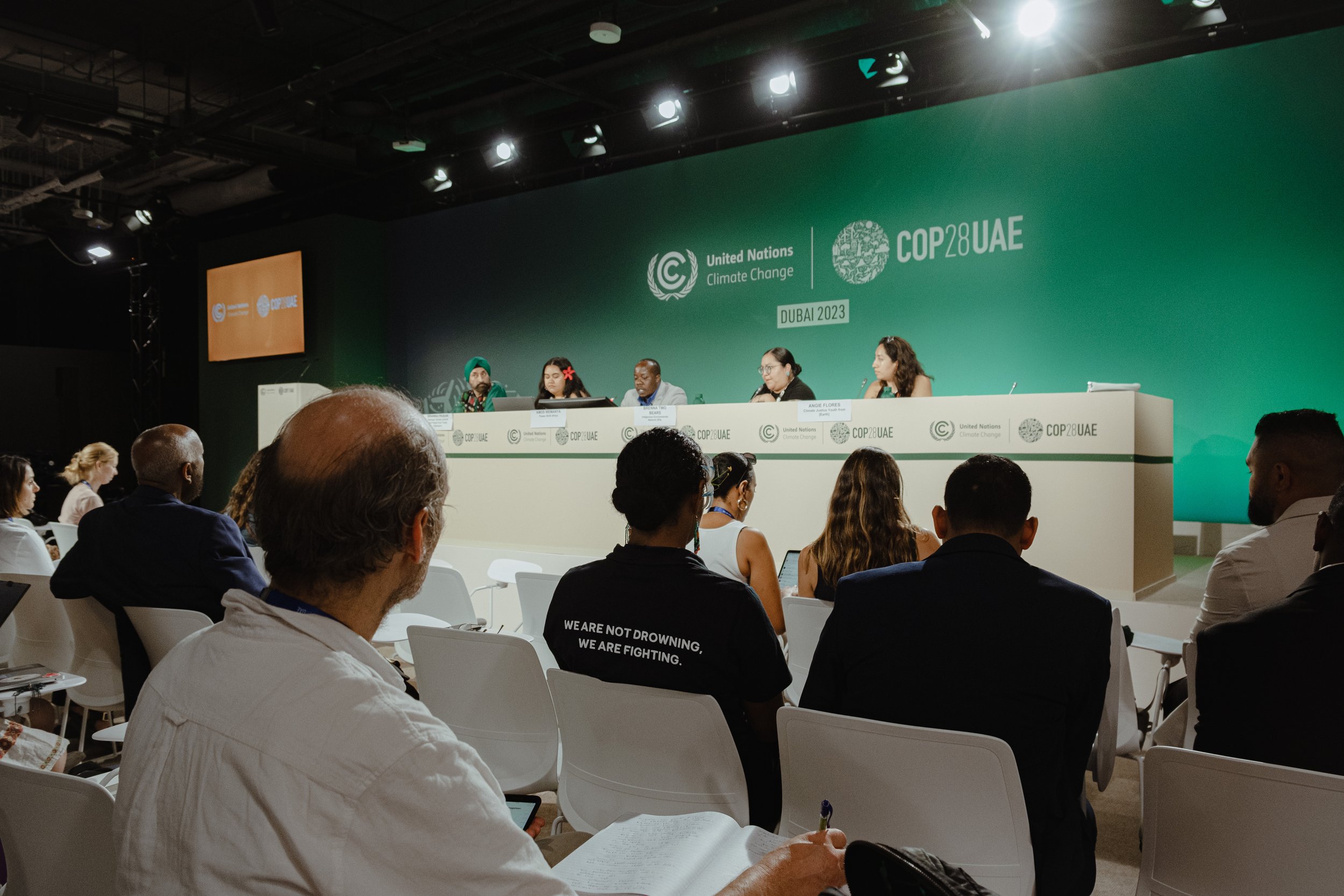
COP28
COP28 hosted by the United Arab Emirates in Dubai from 30 November to 12 December was historic, and yet was not sufficient to keep 1.5 alive. As a result, a growing bloc of nation- states joined forces at COP28 to seek a negotiating mandate for a Fossil Fuel Non-Proliferation Treaty.
-

New York Climate Week
Climate Week NYC is a yearly event in September in New York City. Climate Week occurs alongside the United Nations General Assembly. In 2023, the clear focus of this NYC Climate Week was the call for the phase out of fossil fuels. By partnering with Climate Group, the lead organization behind New York Climate Week, and Global Citizen, the organizers of the Global Citizen Festival, the Fossil Fuel Treaty became a prominent demand at both major events.
-

Youth Climate Camp
The 2023 Youth Climate Justice Camp took place in Lebanon from August 28th to September 2nd. The camp will be an opportunity to build relationships and networks; share stories and lessons learnt from the field; learn new skills through workshops and trainings, and collaborate on opportunities for creative mobilization.
-
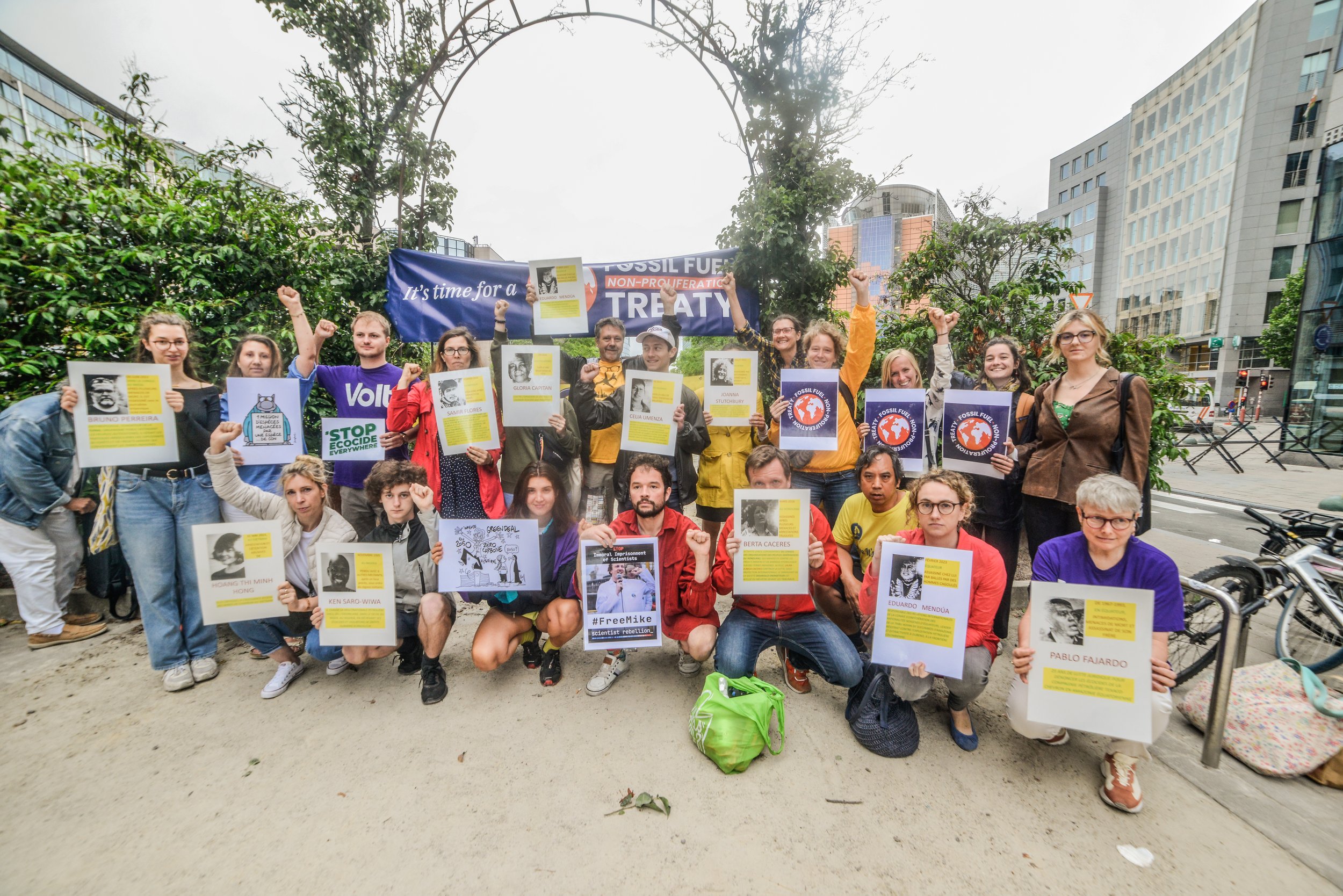
EU Council speed up for climate, nature, and a Fossil Fuel Non-Proliferation Treaty
On 23 March, together with Rise For Climate, European NGOs, scientists and youth organisations, we were in front of the European Council of Heads of State in Brussels to push the 27 to adopt a Non-Proliferation Treaty on Fossil Fuels, an international initiative that aims to phase out oil, gas and coal production and promote a just transition.
-
SB58 at Bonn
SB58 took place at the World Conference Center in Bonn Germany in June of 2023. This conference built upon the past COP27 hosted by Egypt. At Bonn, the Fossil Fuel Treaty alongside many CSOs, Governments, Businesses, and Activists hosted a number of events ranging from Climate and Human Rights Events and an Action to End Fossil Fuels.
2022 Event Highlights
-
Stockholm +50
For the first time an official UN conference, the Stockholm+50 conference has recognised the need to phase out all fossil fuels - oil, gas and coal - and the need for financial and technical support for a just transition for fossil fuel dependent countries as read out in the final plenary. There were calls from the floor calling for a Fossil Fuel Non-Proliferation Treaty and strong calls to end the expansion of fossil fuels
-
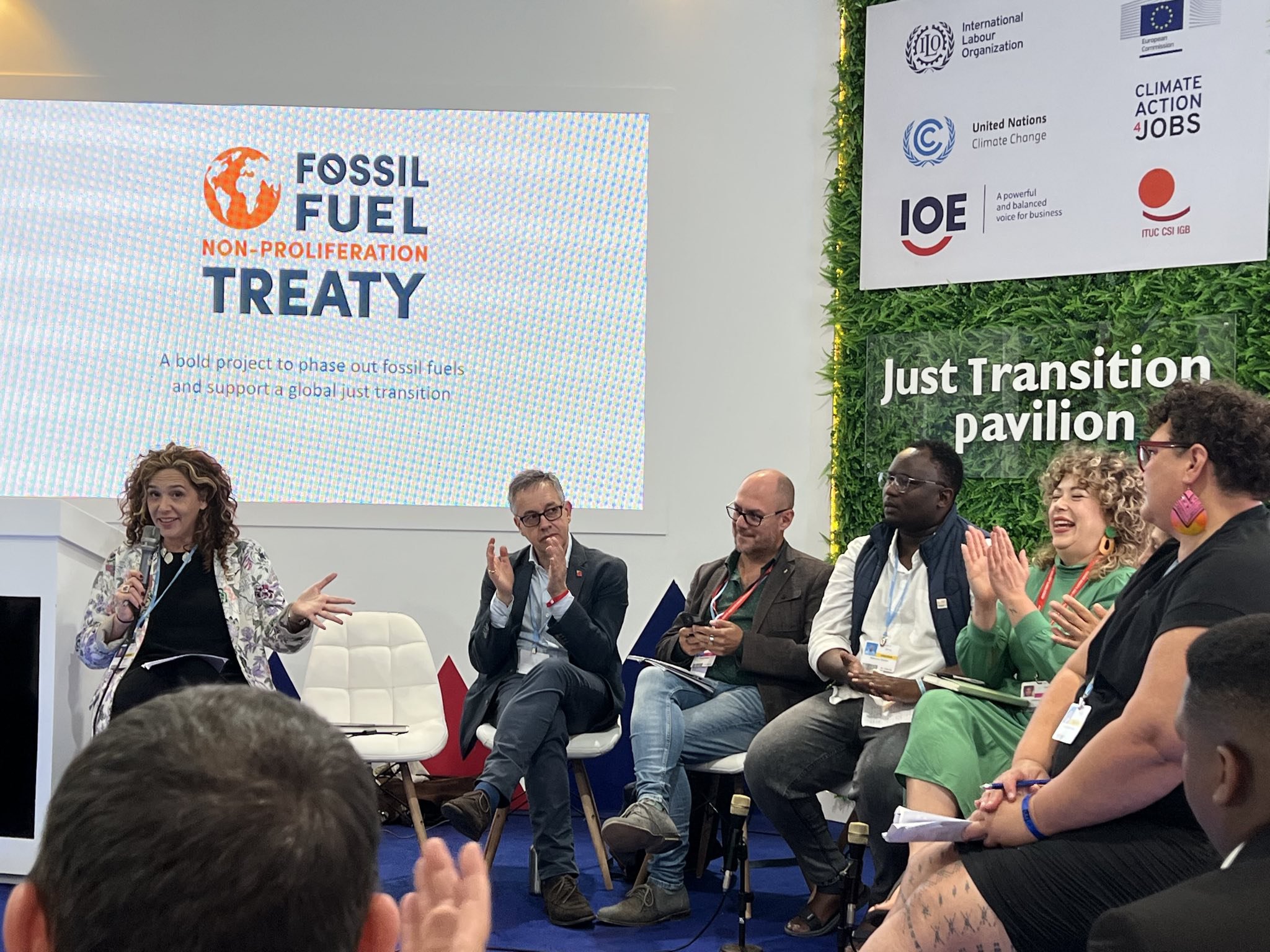
COP27
For the 27th time, the UN climate talks have failed to directly address the biggest driver of the climate crisis: the production of gas, oil and coal. While the agreement to establish a loss and damage fund represents immense progress for vulnerable nations who have been calling for finance to address the impacts of climate change for many years, this win is bittersweet. The failure to address the root cause of loss and damage through agreeing to phase out oil, gas and coal will mean more loss and damage in future.
-
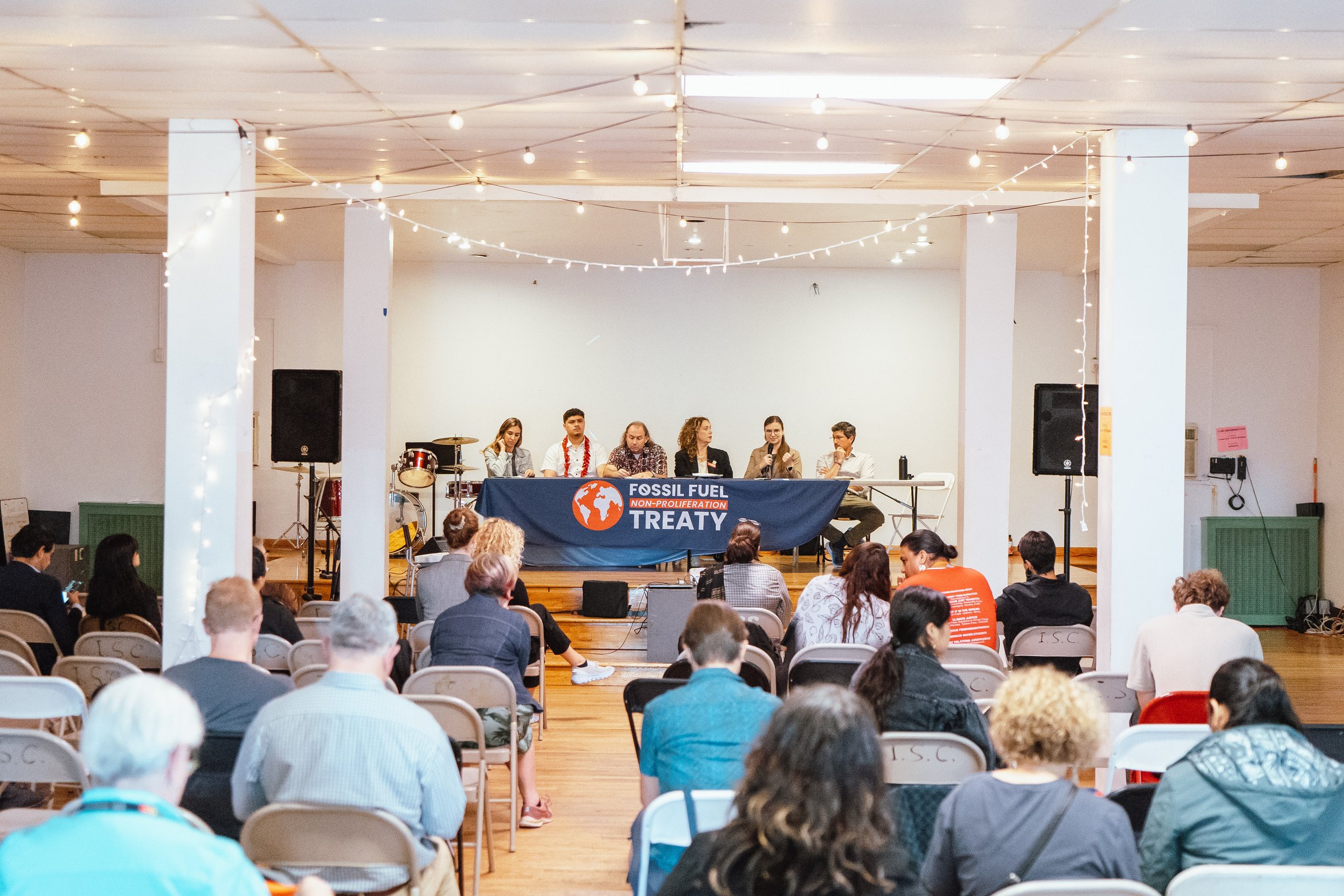
New York Climate Week
During the 2022 New York Climate Week, it was made clear that phasing out fossil fuel production, and fast-tracking progress towards safer and more cost-effective alternatives, will require unprecedented international cooperation. The Fossil Fuel Treaty hosted an international panel of experts discuss opportunities for growing momentum for a Fossil Fuel Non-Proliferation Treaty and how you can get involved to amplify and support the movement.
-

Cities For a Fossil Fuel Treaty Workshop Series: Fossil Free Mobility For Your City
Following Treaty endorsements, cities can prioritise electric and active transport models as key elements of urban mobility. This session focuses on hearing from leading transport voices around the world who are expanding transport electrification and putting active and sustainable mobility at the core of their cities.
2021 Event Highlights
-

Parliamentarians Call for a Fossil Fuel Free Future
Parliamentarians from the Global South initiated a Parliamentarians’ Call for a Fossil Fuel Free Future and are inviting their colleagues from all over the world to join them. The initiative, released at COP26 in Glasgow, was already supported by more than 150 nationally-elected legislators from more than 30 countries around the world. The initiators of the call are Members of Parliament from Bangladesh, Colombia, Costa Rica, Indonesia, Kiribati, Palau, Philippines, Rwanda, South Africa and Timor Leste.
-
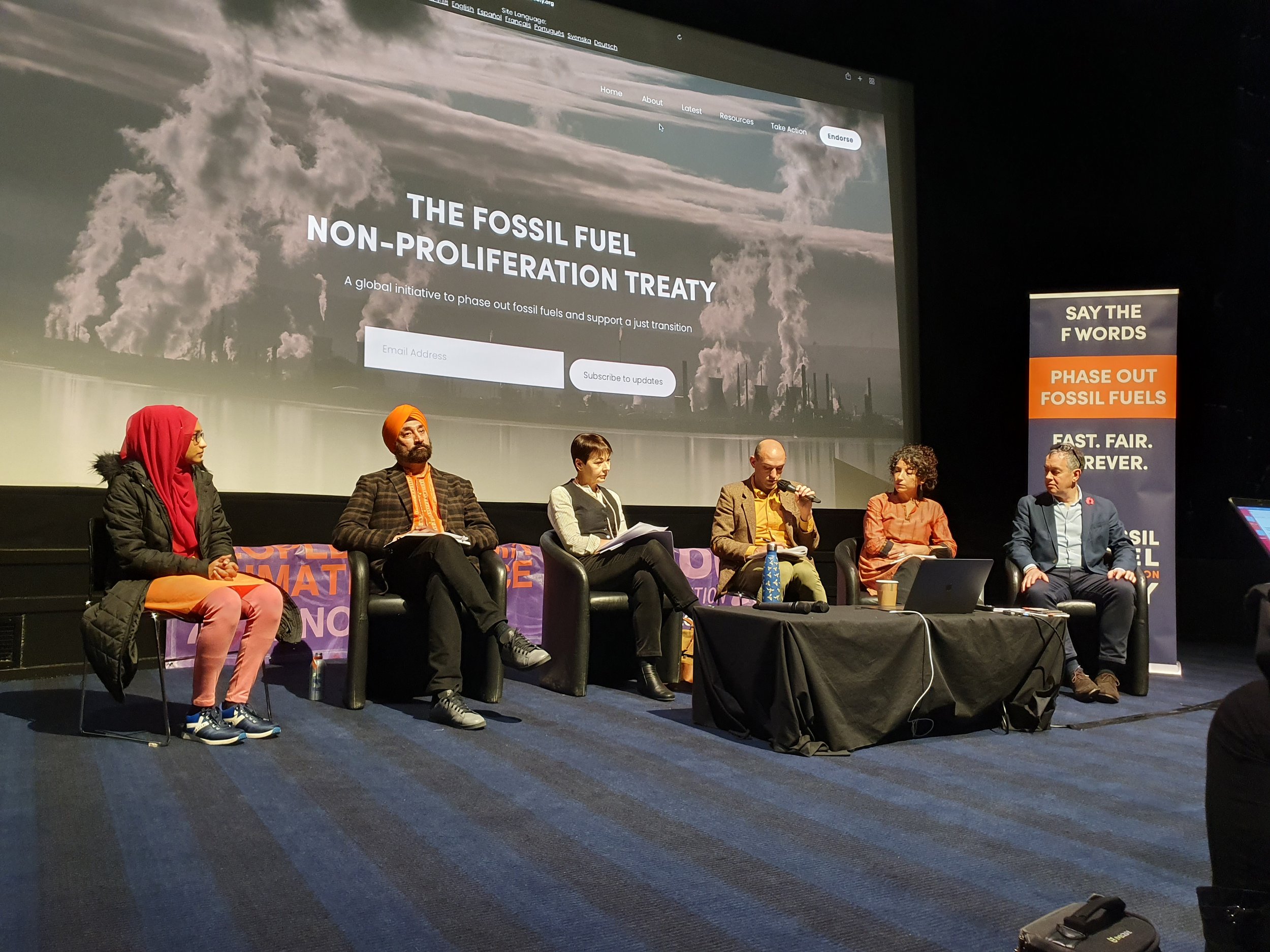
COP26
Negotiators at COP26 laid down their pens and the UK Presidency claimed victory for a successful event despite failing to address directly the elephant in the room, the biggest source of emissions - oil, gas and coal. The meeting was significant in that it marked extended public (and behind closed doors) debate on coal, oil, and gas phase out at a United Nations climate meeting. However, the fossil fuel industry, which had the largest delegation in attendance, wielded its influence, resulting in the last-minute addition of loopholes large enough to drive a coal train through.
-
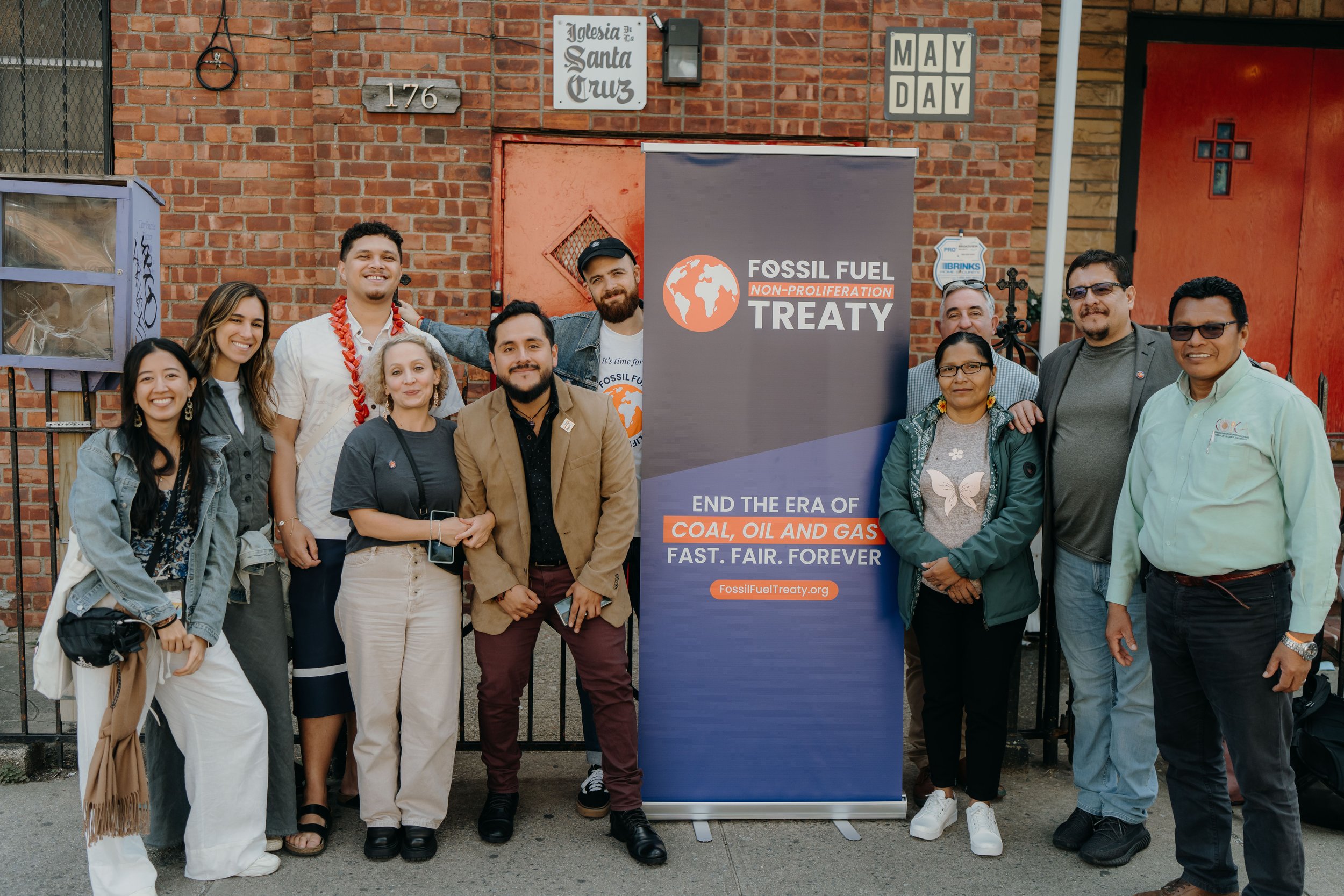
New York Climate Week
At the 2021 New York Climate Week, the Treaty was set to discuss the truth that there are a number of international agreements to tackle climate, but there is currently no international mechanism in place to limit fossil fuel expansion. To address the elephant in the room, the Fossil Fuel Non-Proliferation Treaty discussed wins from the past year and the biggest tasks left to tackle ahead of COP26 and beyond.
-

Global Women's Assembly for Climate Justice
In the context of diverse peoples' movements continuing to organize and rise-up in advance of the UN Climate Talks in Glasgow and other international gatherings over the next critical years, the Women’s Earth and Climate Action Network (WECAN) International is organizing the ‘Women’s Assembly for Climate Justice: Solutions from the Frontlines and the Protection and Defense of Human Rights and Nature’, a free, gender-diverse, public forum. The Assembly will call for urgent action within a climate justice framework and produce an online collection of actions, policy frameworks, and solutions presented at the Assembly to be delivered to global governments, financial institutions and media outlets.
2020 Event Highlights
-

Briefing on the Paris Anniversary & Fossil Fuels
As the 5th Anniversary of the Paris Agreement approached in December 2020, Indigenous, government, civil society, youth and academic leaders joined a press briefing outlining the importance of the issue of fossil fuels to international climate action and steps that can be taken to address their production and proliferation.
-

New York Climate Week
During the 2020 New York Climate Week, the Fossil Fuel Non-Proliferation Treaty hosted numerous events where climate experts and activists spoke out for the need for a Fossil Fuel Non-Proliferation Treaty to manage the decline of coal, oil and gas globally. There was an emphasis on why international cooperation is critical to an equitable global energy transition and how to manage a just transition.
Connect with us for live updates Contact us.-
For general enquiries contact info@fossilfueltreaty.org
-
For media and event enquiries contact media@fossilfueltreaty.org – this email is being monitored 24/7 by our global communications team.
-
For all other campaign enquiries contact info@fossilfueltreaty.org
-
For organisational partnerships and campaign inquiries contact partners@fossilfueltreaty.org and a member of our Global Partnerships team will reach out



































